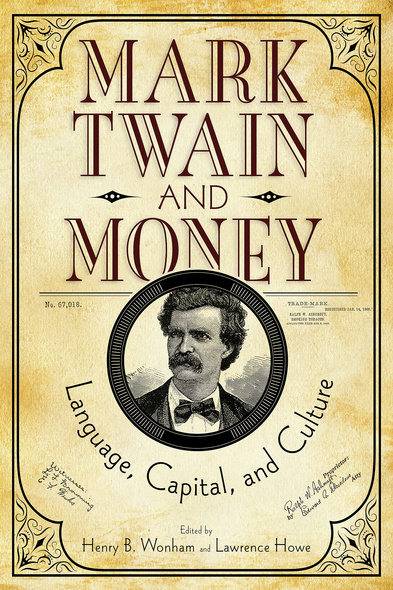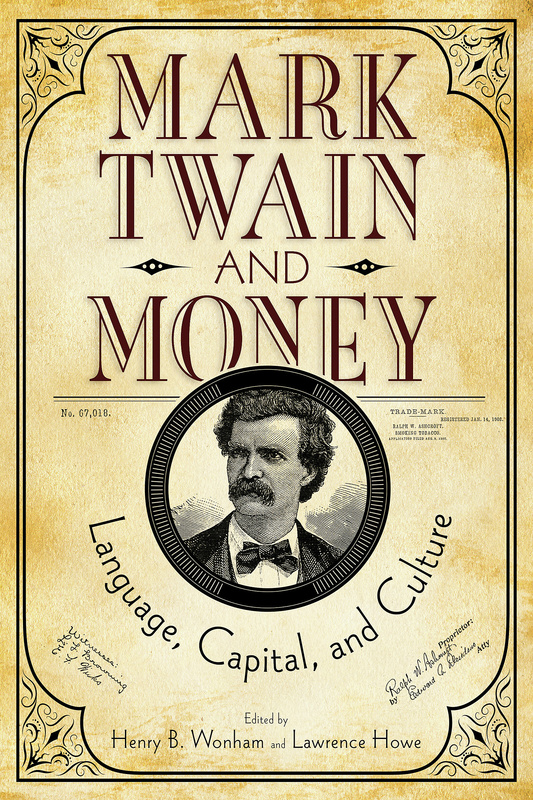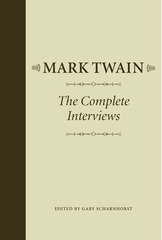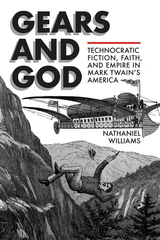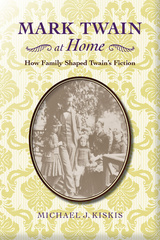Mark Twain and Money
Language, Capital, and Culture
Edited by Henry B. Wonham and Lawrence Howe; Introduction by Henry B. Wonham; Other primary creator Lawrence Howe
University of Alabama Press
This groundbreaking volume explores the importance of economics and prosperity throughout Samuel Clemens’s writing and personal life.
Mark Twain and Money: Language, Capital, and Culture focuses on an overlooked feature of the story of one of America’s most celebrated writers. Investigating Samuel Clemens’s often conflicting but insightful views on the roles of money in American culture and identity, this collection of essays shows how his fascination with the complexity of nineteenth-century economics informs much of Mark Twain’s writing.
While most readers are familiar with Mark Twain the worldly wise writer, fewer are acquainted with Samuel Clemens the avid businessman. Throughout his life, he sought to strike it rich, whether mining for silver in Nevada, founding his own publishing company, or staking out ownership in the Paige typesetting machine. He was ever on the lookout for investment schemes and was intrigued by inventions, his own and those of others, that he imagined would net a windfall. Conventional wisdom has held that Clemens’s obsession with business and material wealth hindered his ability to write more and better books. However, this perspective fails to recognize how his interest in economics served as a rich source of inspiration for his literary creativity and is inseparable from his achievements as a writer. In fact, without this preoccupation with monetary success, Henry B. Wonham and Lawrence Howe argue, Twain’s writing would lack an important connection to a cornerstone of American culture.
The contributors to this volume examine a variety of topics, such as a Clemens family myth of vast landholdings, Clemens’s strategies for protecting the Mark Twain brand, his insights into rapidly evolving nineteenth-century financial practices, the persistence of patronage in the literary marketplace, the association of manhood and monetary success, Clemens’s attitude and actions toward poverty, his response to the pains of bankruptcy through writing, and the intersection of racial identity and economics in American culture. These illuminating essays show how pecuniary matters invigorate a wide range of Twain’s writing from The Gilded Age, Roughing It,The Adventures of Tom Sawyer, The Prince and the Pauper, and A Connecticut Yankee in King Arthur’s Court, to later stories like “The £1,000,000 Banknote” and the Autobiography.
Mark Twain and Money: Language, Capital, and Culture focuses on an overlooked feature of the story of one of America’s most celebrated writers. Investigating Samuel Clemens’s often conflicting but insightful views on the roles of money in American culture and identity, this collection of essays shows how his fascination with the complexity of nineteenth-century economics informs much of Mark Twain’s writing.
While most readers are familiar with Mark Twain the worldly wise writer, fewer are acquainted with Samuel Clemens the avid businessman. Throughout his life, he sought to strike it rich, whether mining for silver in Nevada, founding his own publishing company, or staking out ownership in the Paige typesetting machine. He was ever on the lookout for investment schemes and was intrigued by inventions, his own and those of others, that he imagined would net a windfall. Conventional wisdom has held that Clemens’s obsession with business and material wealth hindered his ability to write more and better books. However, this perspective fails to recognize how his interest in economics served as a rich source of inspiration for his literary creativity and is inseparable from his achievements as a writer. In fact, without this preoccupation with monetary success, Henry B. Wonham and Lawrence Howe argue, Twain’s writing would lack an important connection to a cornerstone of American culture.
The contributors to this volume examine a variety of topics, such as a Clemens family myth of vast landholdings, Clemens’s strategies for protecting the Mark Twain brand, his insights into rapidly evolving nineteenth-century financial practices, the persistence of patronage in the literary marketplace, the association of manhood and monetary success, Clemens’s attitude and actions toward poverty, his response to the pains of bankruptcy through writing, and the intersection of racial identity and economics in American culture. These illuminating essays show how pecuniary matters invigorate a wide range of Twain’s writing from The Gilded Age, Roughing It,The Adventures of Tom Sawyer, The Prince and the Pauper, and A Connecticut Yankee in King Arthur’s Court, to later stories like “The £1,000,000 Banknote” and the Autobiography.
This is an important collection of essays, one that is of value not only to students and scholars of American humor and Twain studies but also to those interested in the broader fields of American studies and in cultural and economic theory.'
—Studies in American Humor
'The 13 essays Wonham and Howe have gathered are mostly biographical, although with numerous applications to the fiction. The book is revisionist in regard to long-dominant notions. Howe points out, in the opening essay, numerous inaccuracies in the ‘Tennessee land’ myth, which haunted the Clemens family with ideas of instant wealth. Other reversals of long-held misconceptions include the idea that Twain was a failure at business. For example, Judith Yaross Lee looks at branding; Joseph Csicsila discusses Twain’s bankruptcy in 1893; and Wonham uses signature moments from Roughing It and Tom Sawyer to redefine Twain’s writing method as a form of ‘arbitrage,’ an imaginative recasting of Twain’s projection of himself as lazy. Other contributions are more cautionary, e.g., Ann Ryan’s suggestion that Twain expresses discomfort with urban poverty and the unappealing mendicants of the Holy Land, a point that must be reconciled with his profound humanity. Though one or two essays are abstruse, these diverse readings offer worthwhile insights. The volume is rightly identified by Wonham as an example of ‘new economic criticism,’ although it also seems reasonably consistent with ideas of American historians Charles Beard and Mary Beard.Recommended.'
—CHOICE
‘Mark Twain and Money is based on sound research and scholarship and offers interesting reassessments of familiar works and valuable new treatments of lesser-known works. This book should be appealing not only to students of Twain but also to Americanists generally and to anyone interested in interdisciplinary studies of American literature and culture.’
—Robert Sattelmeyer, coeditor of One Hundred Years of Huckleberry Finn: The Boy, His Book, and American Culture
Mark Twain and Money is a provocative collection of essays on a subject that is both central to understanding Twain's life, thought, and writing, and, at the same time, focusing on an under-examined aspect of the man and his writing.’
—Tom Quirk, author of Mark Twain and Human Nature and Mark Twain: A Study of the Short Fiction
Henry B. Wonham is a professor of English at the University of Oregon and the author of Mark Twain and the Art of the Tall Tale, Playing the Races: Ethnic Caricature and American Literary Realism, and Charles W. Chesnutt: A Study of Short Fiction. He is also the coeditor of Tales of Henry James, Second Edition.
Lawrence Howe is a professor of English and film studies at Roosevelt University. He is the author of Mark Twain and the Novel: The Double-Cross of Authority and the coeditor of Refocusing Chaplin: A Screen Icon through Critical Lenses.
Lawrence Howe is a professor of English and film studies at Roosevelt University. He is the author of Mark Twain and the Novel: The Double-Cross of Authority and the coeditor of Refocusing Chaplin: A Screen Icon through Critical Lenses.

